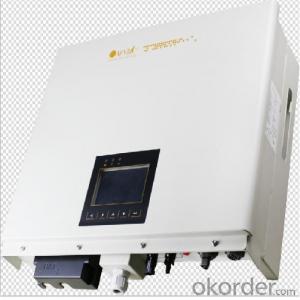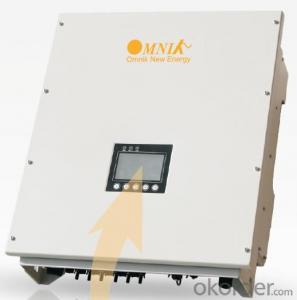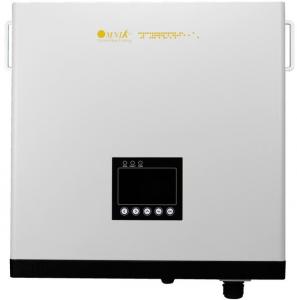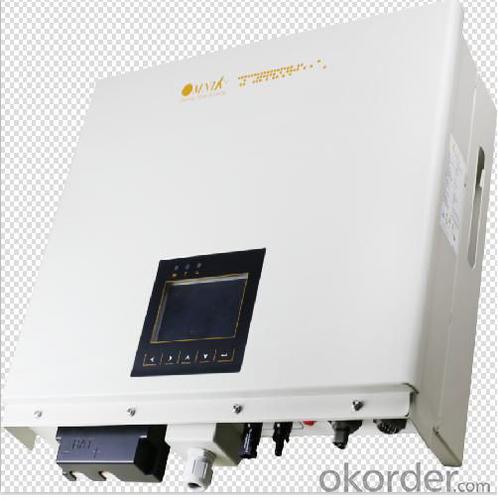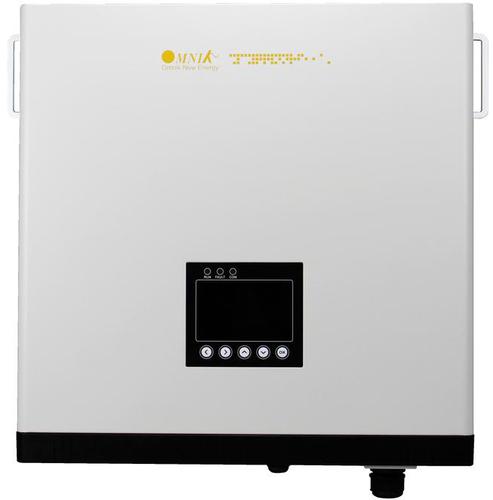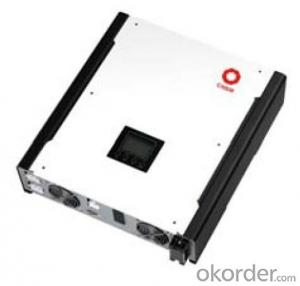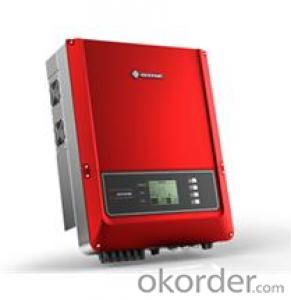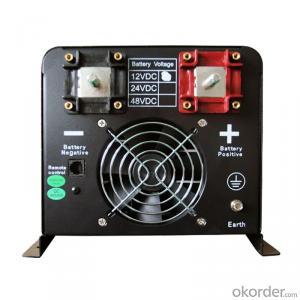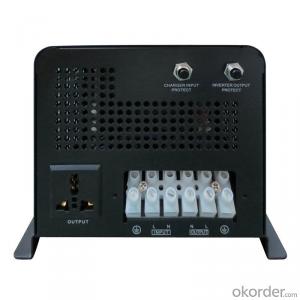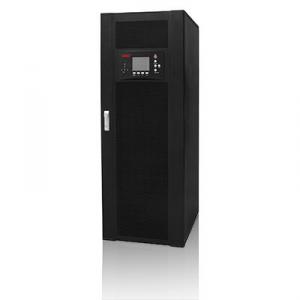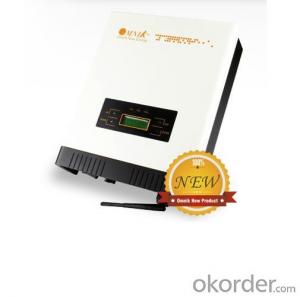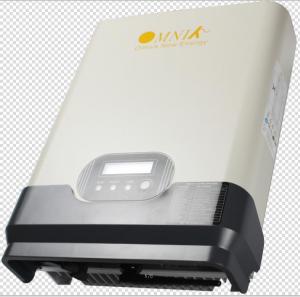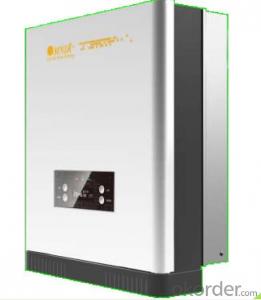480V On Grid Solar Inverter Omniksol-17k-TL
- Loading Port:
- Shanghai
- Payment Terms:
- TT or LC
- Min Order Qty:
- 100 pc
- Supply Capability:
- 3000 pc/month
OKorder Service Pledge
OKorder Financial Service
You Might Also Like
Omnik new energy solar inverter
Omniksol-2.0k-TL Photon Efficiency up to 3kW
in the world------ Photon tested Jan. 2012.
Omniksol-17k-TL
Futures
Max. Efficiency 98.2%, Euro. Efficiency 97.8%.
Double MPPT, MPPT accuracy up to 99.9%.
IP65 design, work properly under severe outdoor circumstances.
Full solution of safety protection, DC switch integrated.
Flexible input and output connections, support RS485, Ethernet
and USB communication.
Transformerless design and high power density, lighter and more
convenient for installation.
technical data:
Type | Omniksol-13k-TL | Omniksol-17k-TL | Omniksol-20k-TL |
Max. PV-Generator Power [W] | 13500 | 17600 | 21200 |
Max. DC voltage [V] | 1000 | 1000 | 1000 |
MPPT DC voltage Range [V] | 400-800 | 440-850 | 440-850 |
Turn off DC voltage [V] | 640 | 640 | 640 |
Max. DC Current [A] | 22/11 | 22/22 | 22/22 |
Nominal DC Current [A] | 28 | 33 | 33 |
Number of DC Connection | 2 | 2 | 2 |
DC-Connection | MC4 | MC4 | MC4 |
Number of MPP trackers Turn on Power [W] | 2 | 2 | 2 |
| Omniksol | |||
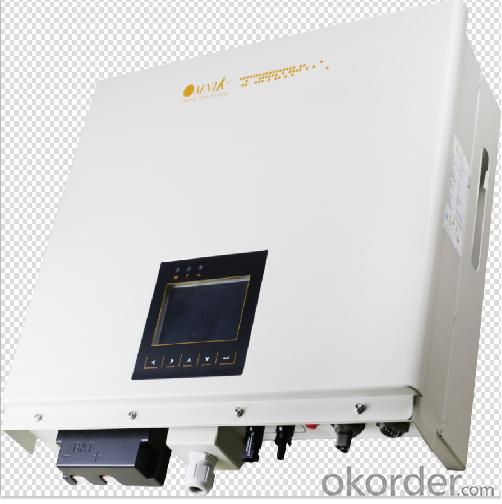
FAQ
Q1. What is the difference between inverter and solar inverter?
A1. Inverter only has AC inpput, but solar inverter both connect to AC input and solar panel, it saves more power.
Q2. What is the difference between MPPT&PWM?
A2. MPPT has higher efficiency, it can track the max power point and won't waste energy.
- Q: Can a solar inverter be used with a smart home automation system?
- Certainly! A smart home automation system can indeed work together with a solar inverter. Nowadays, many solar inverters come with communication capabilities built-in, like Wi-Fi or Ethernet connectivity. This means that they can easily be integrated into a smart home automation system. This integration allows homeowners to remotely monitor and control their solar power production and usage using a smartphone app or a central control panel. By having a smart home automation system, users can keep track of real-time energy generation, make adjustments to settings, and receive notifications about system performance or any potential issues. This integration not only enhances the convenience and efficiency of managing solar power but also enables better optimization and synchronization with other smart devices and appliances in the household.
- Q: What is the maximum number of AC outputs in a solar inverter?
- The maximum number of AC outputs in a solar inverter varies depending on the model and design of the inverter. Some solar inverters may have a single AC output, while others can have multiple AC outputs, ranging from two to four or even more.
- Q: What is the maximum DC input current of a solar inverter?
- The maximum DC input current of a solar inverter can vary depending on the specific model and its design. However, in general, the maximum DC input current of a solar inverter is determined by its capacity and is usually specified by the manufacturer.
- Q: What is the role of a solar inverter in a solar power system?
- The role of a solar inverter in a solar power system is to convert the direct current (DC) electricity produced by the solar panels into alternating current (AC) electricity that can be used to power household appliances and be fed back into the electrical grid. The inverter also ensures that the power generated by the solar panels is at the correct voltage and frequency for safe and efficient use.
- Q: Can a solar inverter be used with a solar-powered CCTV system?
- Yes, a solar inverter can be used with a solar-powered CCTV system. A solar inverter is responsible for converting the direct current (DC) generated by the solar panels into alternating current (AC) that can be used to power the CCTV system. By connecting the solar panels to a solar inverter, the energy produced by the sun can be harnessed and efficiently utilized by the CCTV system.
- Q: What is the role of a solar inverter in power factor correction?
- The role of a solar inverter in power factor correction is to adjust the power factor of the solar power system to ensure efficient energy conversion. It helps in balancing the reactive power and real power, leading to improved overall power quality and reduced system losses.
- Q: What is the maximum power output of a residential solar inverter?
- The maximum power output of a residential solar inverter can vary depending on the specific model and capacity. However, on average, residential solar inverters typically have a maximum power output ranging from 3 kilowatts (kW) to 10 kW.
- Q: What is the impact of a solar inverter on the overall system cost?
- A solar inverter can have a significant impact on the overall system cost. It is an essential component that converts the direct current (DC) produced by solar panels into alternating current (AC) that can be used by electrical appliances and fed into the grid. The quality and efficiency of the inverter play a crucial role in optimizing the energy production and overall performance of the solar system. High-quality inverters tend to be more expensive but can enhance the system's reliability, lifespan, and energy yield. Therefore, while a solar inverter does add to the system cost, investing in a reliable and efficient one can result in long-term benefits and returns by maximizing the system's overall performance.
- Q: What are the methods of photovoltaic grid-connected inverter control
- and can set the dead time between the upper and lower arms, the use of INTEL 80C196MC to achieve sine wave output circuit, 80C196MC to complete the sine wave signal, AC output voltage, to achieve regulation. Circuit output generally use LC circuit filter high frequency wave, get pure sine wave.
- Q: What is the role of a solar inverter in a residential system?
- The role of a solar inverter in a residential system is to convert the direct current (DC) electricity produced by solar panels into alternating current (AC) electricity that can be used to power household appliances and be fed back into the grid if there is excess energy. Additionally, the inverter ensures the efficiency and safety of the system by monitoring and regulating the flow of electricity.
Send your message to us
480V On Grid Solar Inverter Omniksol-17k-TL
- Loading Port:
- Shanghai
- Payment Terms:
- TT or LC
- Min Order Qty:
- 100 pc
- Supply Capability:
- 3000 pc/month
OKorder Service Pledge
OKorder Financial Service
Similar products
Hot products
Hot Searches
Related keywords
